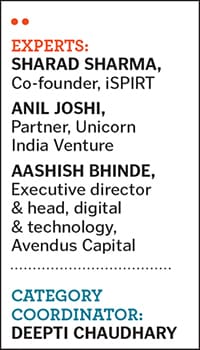
Sahil Barua: Leading E-commerce logistics with Delhivery
The potential of ecommerce logistics is a no-brainer and Sahil Barua's Delhivery spotted the opportunity before most in India
Sahil Barua | 29
Co-founder: Delhivery
Category: Ecommerce
So far, it’s been mostly clear blue skies for Sahil Barua, co-founder and chief executive of ecommerce logistics services company Delhivery. His three-year-old startup has grown 400 percent year-on-year and investors have been queuing up too. The grey clouds have been few and far between, and those Barua recalls with visible sadness. For instance, the time a young man, among the first twenty-five employees to join the firm, decided to leave after 18 months. “It was like breaking up with someone,” says Barua.
But Barua, as co-founder (along with Mohit Tandon, Bhavesh Manglani, Suraj Saharan and Kapil Bharati) of one of the fastest growing startups in the country, can put such worries aside. What started out as a hyper-local express delivery service for offline stores in May 2011, delivering flowers and food from restaurants in Gurgaon for the first few months, is now emerging as a major ecommerce logistics player.
It was all in the timing. 2010-11 saw dozens of online retailers floating businesses and millions of dollars being poured into the segment by global investors. Barua and Tandon, who were working as consultants in Bain & Co, were impressed by the potential of the industry in India. In June 2011, Delhivery got its first ecommerce client, urbantouch.com, an online fashion and beauty retailer. “In August, we made the shift to ecommerce logistics and became focussed on this space,” says Barua. (Barua, who turned 30 on December 25, was 29 in the period considered for the 30 Under 30 List.)
Today, Delhivery has 950 ecommerce companies as its customers; this includes Flipkart (which also has its in-house logistics team). It has six warehouses, a presence across 175 cities and handles over 90,000 shipments daily. Its revenues are sky-rocketing too. From a turnover of Rs 62 crore for FY14, Barua expects to register revenues of Rs 220 crore by the end of March.
Though several e-commerce logistics providers, such as Chhotu.in and Dialaservice.net, have shut down over the last two to three years, there continues to be strong competition in the sector, with firms like Ecom Express and QuickDel Logistics jostling for space. But Delhivery believes it has an edge: Not only is it an early entrant but it caters to non-ecommerce clients too. Then, except for website creation, it can handle all other IT and backend requirements of an online player; no other ecommerce logistics firm provides these services, claims Barua.
Suvir Sujan, co-founder and managing director, Nexus Venture Partners, which invested in the company twice, says Barua is an “outlier” in this space. “He is solving a real problem, not reacting to an issue. He is ensuring widest coverage (in ecommerce) in the shortest time at the minimum cost. He has a laser focus on problems in ecommerce and has created a model around them (Delhivery) ensuring sustainability even with these thin-margin businesses,” says Sujan.
Investors are clearly biting. Over the last three years, Delhivery has raised three rounds of funding, reaching a total corpus of $42 million. In 2012, it raised an undisclosed amount from Times Internet Ltd. A year later, it garnered nearly $5 million from Nexus Venture Partners. In September 2014, it raised $35 million in funding, led by Multiples Alternate Asset Management. The third round also saw participation from existing investors Times Internet and Nexus Venture Partners.
The company now has clearly defined lines of business—ecommerce (950 clients), brands like Wildcraft (60 clients) as well as small and medium enterprises (45,000 clients). For its ecommerce clients, Delhivery offers IT support including inventory and order management, fulfillment and logistics services, handling of payment, managing the supply chain, among others. For enterprises, which are typically listed on marketplaces, Delhivery helps in order management, warehousing and shipping. For its brands clients, Delhivery offers help in creating in-store kiosks, demand forecasting, fraud detection, order fulfillment, warehousing, delivery, etc. The revenue model depends on the service provided. For transport, it has a per consignment basis model. For warehousing, it is per unit stock. For IT services, there is a fixed charge or a percentage of revenues.
Gaurav Deepak, managing director, Avendus Capital, who helped Delhivery raise its latest round of institutional funding, calls Barua a mature, thoughtful leader. “He is someone you can trust to perform. They are a cohesive team, the roles are well defined and they stick to them. They are constantly focussed on increasing market share and growth,” says Deepak.

Despite scaling up fast, Delhivery has some indisputable challenges. The ecommerce space in India has seen the emergence of three firms—Flipkart, Amazon and Snapdeal—who together dominate the $3 billion industry. “The price negotiation power of these companies has gone up tremendously,” says Deepak Srinath, an entrepreneur and former director (corporate finance-technology) with Allegro Capital Advisors.
Barua, however, is sure that as long Delhivery continues to be a value player, it will emerge a winner. Mostly, though, Barua reminds us that he is a “very impatient, angry young man” who is ready to take on the world.
Here is the full list of 30 Under 30 for 2015 and its methodology
(This story appears in the 30 November, -0001 issue of Forbes India. To visit our Archives, click here.)






